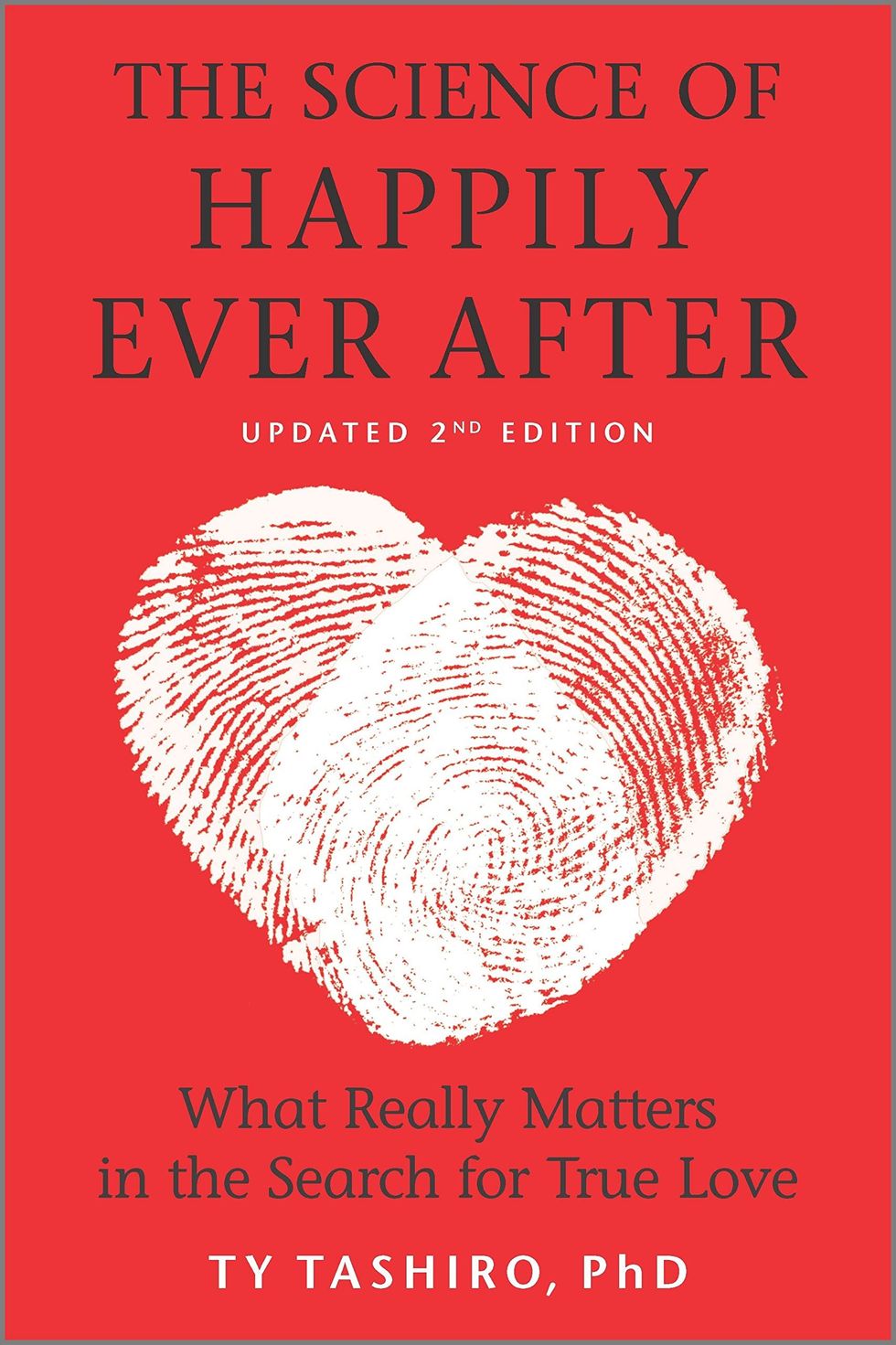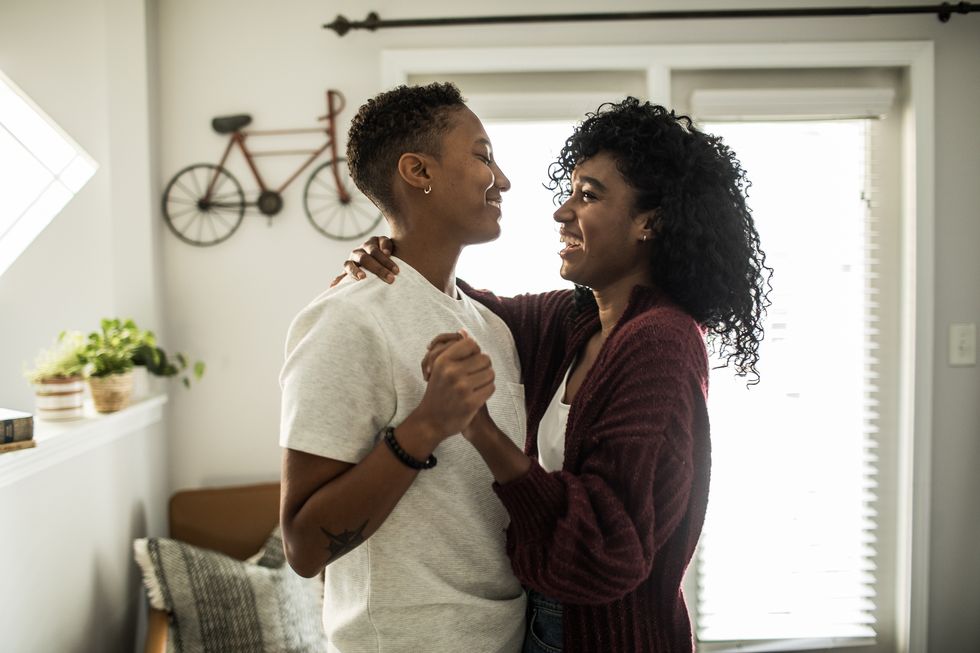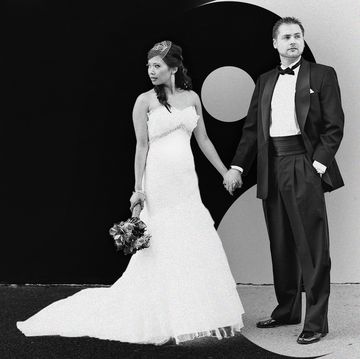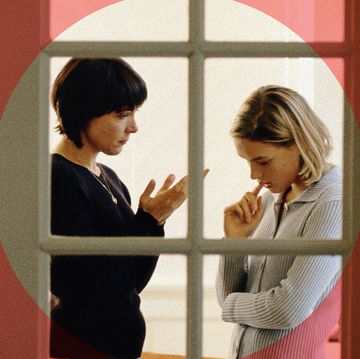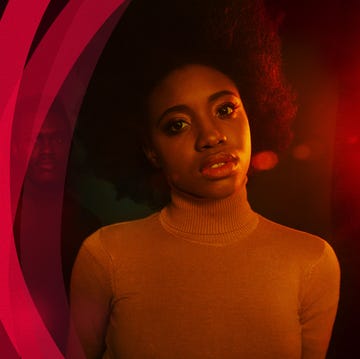Hailey Austin met Lewis Dobie for the first time in a pub while attending a ski club meeting in college. She didn’t originally want to go, but her Italian flatmate convinced her because there was free beer. Austin never received an on-the-house pint — the free beer ran out by the time she arrived — but she did leave with a life partner in Dobie.
Austin, who hails from Colorado, is a 28-year-old American video game researcher who works as a lecturer in visual design and culture at Abertay University in Scotland. Dobie, her soon-to-be husband, is a 29-year-old Scottish field service engineer. Back when they were students, they shared similar goals in life, and traveling always brought them together. When they left school and started their respective jobs, they started to pick up on differences in what brings them meaning.
Austin preferred living in the city, but Dobie wanted more open space. Austin thrived on socializing, while Dobie favored alone time. Austin was enjoying her job, and Dobie was struggling with his career. “We went through a moment where we had to really evaluate where we were,” Dobie says. “We were in totally different positions, and that incongruity created a bit of an issue between us.” Many conversations and a recalibration were necessary to move forward. “If our paths seemed to be divergent, then what can we do with that?” Dobie adds. “The big thing for us was, as always, communication.”
The couple ultimately realized that they are individuals and that it’s okay to have different goals and sources of fulfillment while supporting each other along the way. “We can maintain our shared purpose,” Austin says, “and value each other’s individual life purpose as well.”
The couple made a plan to move to the countryside of Scotland together to create a space where they could pursue all their interests. Dobie found a new job and spends his spare time building and making things around the house. Austin gets her fill of socializing by going out with friends and joining groups like a horse-riding club. Together, they travel and share hobbies, such as tending to a garden they started, while also taking time to revel in what brings them their own unique flavor of happiness: for Austin, making homemade cider and wine, and for Dobie, making soaps.
“We all have certain values we want that we think will make our life meaningful or purposeful,” says Ty Tashiro, a relationship expert and author of The Science of Happily Ever After. “When our day-to-day activities match those aspirations, and we feel like we’re on some trajectory to achieve those things, that’s when we feel the presence of purpose or the presence of meaning.”
Being completely in sync with your partner and aligned 100 percent creates a tremendous amount of pressure and opportunities for disappointment. “There’s a whole area of research in social psychology about [what’s called] irrational beliefs in relationships,” Tashiro says. “One of these irrational beliefs is that you and your partner could share everything.”
Leanna Stockard, a licensed marriage and family therapist at LifeStance Health, says a healthy combination of both an individual and joint sense of purpose makes for fulfilling relationships. “It’s really important for us to maintain our individual goals, our values, and purposes,” Stockard says, “and make sure that we do have a partner that enjoys that purpose and wants to help support you and navigate through all of that as well.”
Purpose’s place in a relationship
Self-expansion is a psychological term that refers to the act of widening our understanding of who we are, what we’re capable of doing, and how we view life. We can do this by taking classes, reading books, traveling to unfamiliar places, picking up a new hobby, or making sense of our personal experiences. You can also expand and develop new aspects of your sense of self through a relationship.
Sharing activities with someone you love or communicating and being validated in one’s own individual findings and passions can help bring you closer to your higher self. Despite this fact, a 2021 Pew Research report found that fewer Americans — 9 percent of people, down from 20 percent in 2017, in fact — now mention spouses or romantic partners as a source of meaning in life. Tashiro says this could be because people underestimate the potential and power of partnership.
“We’re just so distracted,” Tashiro says. “Even though people shouldn’t expect all of their purpose to come from their partner, it’s one of the best forces for purpose. When you’re in a healthy relationship, it’s one of the most meaningful things that could make us happy in our life, so it deserves our attention.”
The spirit of captivation and investment in the other person keeps purpose — and your spark — alive. It also ties in to self-expansion. “If you’re curious and respectful about those pursuits that they have,” Tashiro says, “how cool is that? Now, you’re learning, expanding yourself, and opening your mind.” The key is having both the respect for your partner’s different sources of meaning and the determination to care about who they are and who they become throughout their lifetime.
Relationships provide their own meaning
Michael F. Steger, a psychology professor and director of the Center for Meaning and Purpose at Colorado State University, says purpose is a part of overall meaning and that relationships can be a source of purpose. “One of the cool things about purpose is it’s future oriented,” he explains, “but you do something about it every day.”
Meaning doesn’t merely refer to huge life goals. It happens daily in our relationships. But over time — even in a healthy relationship — we begin to habituate and take for granted how the other person’s presence serves or adds to our life.
“There are small meaningful acts that occur every day in a relationship,” Tashiro says. “Be mindful about that, savor those moments, and share with your partner how much you appreciate those things.” If you feel like purpose and meaning need some dusting off in your partnership, it’s never too late. Here’s how to refresh purpose in your relationship:
Sharpen your individuality
It’s important not to lose your sense of self in a relationship, and having individual purpose can keep you anchored. “Having that individual sense of purpose is important for you to make sure that you are living your life as your authentic self,” Stockard says. Think about what you are striving for in life, and then openly communicate it to your partner — and vice versa.
“We are not the same people all throughout our life, and I think it’s important that we don’t pretend to be,” Stockard adds. A great way to get to know each other is by getting to know yourself. “Make sure that you’re checking in with your partner’s values, your partner’s morals, what their interests are, and what their hobbies are.”
Support your partner
It’s natural to be nervous when our partners are growing into a new sense of themselves. As long as no one is trying to stop the other’s evolution or differences, it’s not the end of a union. “When you have places where you diverge in your relationship on a sense of purpose or a sense of meaning, don’t treat that as something threatening or something to be fearful about,” Tashiro says. It’s time to celebrate it.
When your significant other shares what brings meaning and excitement to their life or even their day, don’t gloss over these moments. You can create a sense of purpose in your relationship by showing emotional investment in what’s happening to them along their path.
“There’s this phenomenon called capitalization,” Tashiro explains, referring to opportunities to share a positive experience and receive a positive response in return, emphasizing the effects of the event for that person. “Turn the TV off or whatever it might be, put the phone down, and just look in [their] eyes and say, ‘That’s great. Tell me more about that.’” The lingering effects of these interactions can last for days and boost your relationship’s well-being and definition as a team.
Create a new joint purpose
Being in a committed relationship means you’re creating a life with somebody. Throughout time, you or your partner will change, grow, adopt different interests, or find new meanings behind life. It’s important to ensure that you’re not running completely parallel lives but are intertwining throughout. Having a common thread that brings you back together is a great way to stay connected. “You can absolutely create a joint purpose as you continue on in a relationship,” Stockard says, “and as you get to know each other more as we grow and change.”
A joint purpose can be the long-term aspiration you’re striving for together as a couple that may not be possible alone. It can also be small ways you find fulfillment day-to-day. From starting a business together to simply going to dinner, whatever you land on together will bring you closer.
Mia Brabham is a staff writer at Shondaland. Follow her on Twitter at @hotmessmia.
Get Shondaland directly in your inbox: SUBSCRIBE TODAY


